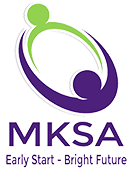Does your child have a favorite book they like to hear? Do you enjoy sharing your favorite childhood book with your child? That’s a win-win! Reading to children is important for many reasons including cognitive benefits, stronger social, emotional and character development, decreased levels of aggression, and stronger vocabulary. It strengthens your relationship with your kids and—best of all, helps kids develop a lifelong love of reading.
At just several months of age, an infant can listen to your voice, look at pictures and point to objects on pages. Children learn to love the sound of language before they even notice words on a page. Reading to children stimulates their imagination and expands their understanding of the world. It helps them develop language and listening skills and prepares them to understand written words.
Supported Cognitive Development
Reading to a child has been proven to improve cognitive skills and aid in cognitive development. Cognitive development is the emergence of the ability to understand and think, the construction of thought processes, including remembering, problem solving and decision-making, from childhood through adulthood. How a person perceives his world through areas such as information processing, reasoning, language development, attention span and memory are parts of cognitive development. Reading also stimulates brain cell activity. The more an adult reads to a child, the larger their vocabularies grow, and the more they understand about the world around them.
Better Language Skills
Reading exposes children to new speech patterns and vocabularies. They learn to absorb information on how to form a sentence and use words effectively, helping them develop better communication skills. Reading stimulates the part of the brain that allows children to understand the meaning of language and helps build key language, literacy, and social skills. This is especially important when you consider that, according to the American Academy of Pediatrics, more than one in three children start kindergarten without the skills they need to learn to read. Research has shown that kindergarten children who were read to at least three times a week had a significantly greater phonemic awareness than did children who were read to less often.
Prepare for Academic Success
By helping children to grow their vocabulary skills with exposure to new words and listening skills, they are better positioned for academic success. Studies show that students exposed to reading before preschool are more likely to do better when their reach their period of formal education. By jumpstarting a child’s reading success, they experience stronger growth in the following areas:
–phonemic awareness: being able to hear, identify and play with individual sounds
–phonics: being able to connect letters of written language with sounds of spoken language
–vocabulary: words needed to communicate effectively
–reading comprehension: being able to understand what has been read
–fluency (oral reading): ability to read text accurately and quickly
Reading Helps Children with Special Needs
For children with special needs, looking at faces and body language in a story helps them learn about nonverbal cures of communication. More than just being able to read or write, literacy is a key component of learning, development, communication, and a richer life. It’s not only about being understood, but also about being able to comprehend your world. Developmental delays can affect a child’s motors skills, social-emotional development, daily skills, and cognitive abilities. Reading can augment other learning styles—visual, auditory, tactile, and more. A child can look at an apple, bite it, do an apple puzzle, and read about apples. Looking at picture books can enhance a child’s ability to recognize pictures and what is happening in them, to generalize into his environment.
Literacy helps a child learn about herself and her feelings. When a child is stressed or had an afternoon meltdown but can’t tell you how he’s feeling, reading can often be a comfort. For example, a fun rhyming book about emotions, ending with “how do you feel today?” can offer a child a way to share feelings they might not be able to express otherwise, by allowing them to point to a picture in the book relating to their emotions.
Special Bonding with Your Child
One of the most important things you can do to positively influence a child’s development is spend time with them. Reading to your child provides a wonderful opportunity to have a regular, shared event where you look forward to spending time together. Reading provides invaluable nurturing and reassurance to a child, even as a baby. Young babies love to hear familiar voices and reading is a perfect way to foster this connection. A strong parent/caregiver-child relationship can develop from a child knowing you’ll read together at a predictable, scheduled time that fits into daily routines. Reading aloud together gives you and your child something to talk about, which can also be used to discuss real-life experiences.
Increase Concentration and Improved Creativity
According to earlymoments.com, along with reading comprehension comes a stronger, self-discipline, longer attention spans and better memory retention. Additionally, reading can open doors to new worlds for your child as they use their imaginations to explore people, places, and events beyond their own experiences, shared with them through reading aloud.
Resources
Take a look at this comprehensive list of 100 Books Every Child Should Hear Before Kindergarten. https://files.constantcontact.com/de0ceffa301/83882bd3-3d51-4f8c-a258-132be9314128.pdf
PBS Kids Read! https://www.pbs.org/parents/read
Life is hectic and parents/caregivers are busy. Taking the time to read with your child on a regular basis sends an important message that reading is worthwhile. Go to the bookstore together and let your child select a new book. Go to the library and borrow several books by different authors. Get excited! Help your child grow into an adult who reads easily and frequently whether for business, knowledge or pleasure.
References
www.pacer.org/ec/early-literacy/literacy-opens-the-world.asp
readingrockets.org
www.pbs.org/parents/thrive/why-reading-aloud-to-kids-helps-them-thrive
www.all4kids.org/news/blog/the-importance-of-reading-to-your-children/
